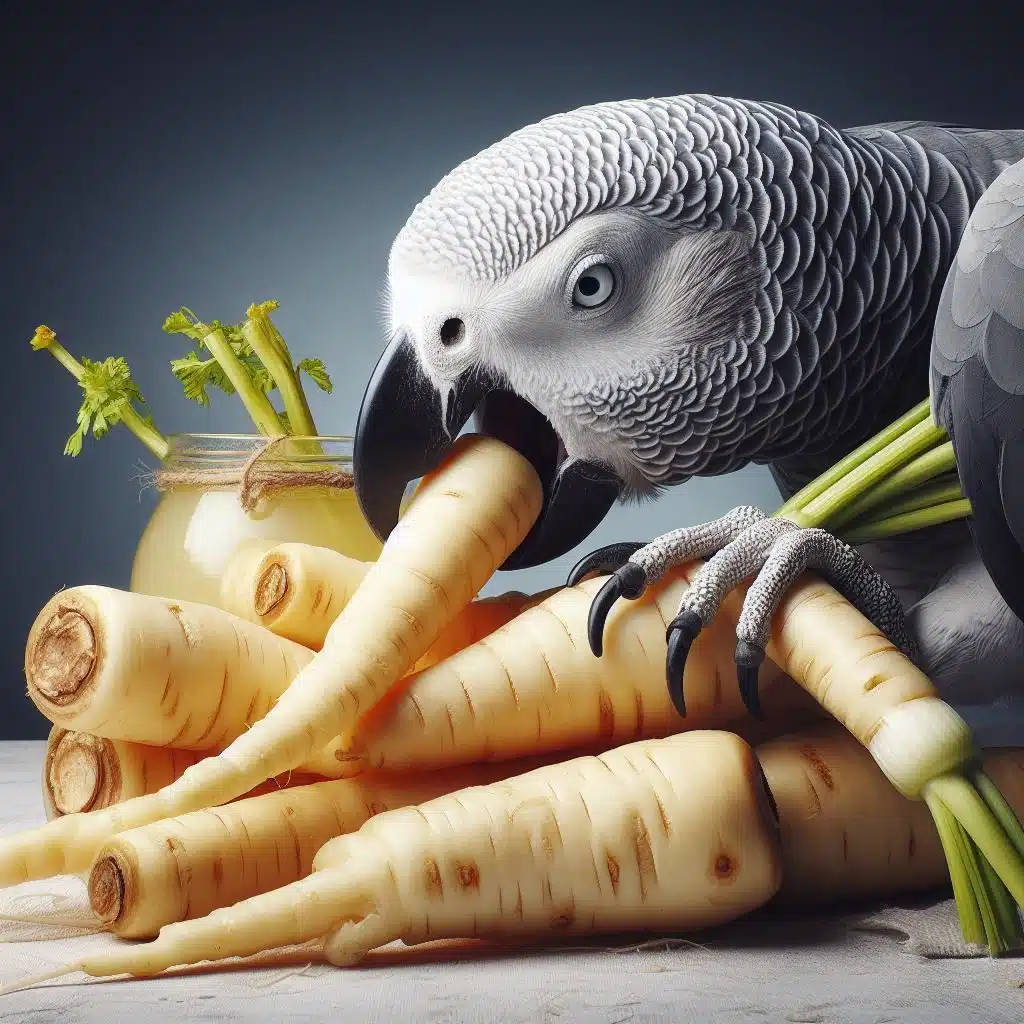A parrot diet should consist mainly of seeds, with a combination of fruits and vegetables thrown in for that well-needed nutrition. However, this doesn’t mean that every single fruit and vegetable is going to be safe for your parrot to eat. The vegetable in question today is the parsnip, if you’re on this page I’m assuming you want to know if it’s suitable for your parrot to eat so I’ve decided to cover it in detail.

Can parrots eat parsnips? Yes, parrots can eat parsnips, they contain many vitamins and minerals like vitamin C, vitamin K, vitamin E, fiber, and magnesium. Not only are parsnips safe to eat but they are a great source of quality nutrition your parrot will need in their diet. They are also super easy to prepare and cheap making them a great choice of vegetable.
I’m going to further explain the benefits, how to prepare them, and some other things so it’s important to read on to avoid missing out on any information!
Parsnips Benefits For Parrots
We know is good for our Parrots, but just how good is it? Let’s take a closer look at the nutritional content.
One-half cup of raw, sliced parsnip contains:
| Calories | 50 |
| Protein | 1g |
| Carbs | 12g |
| Fat | 0g |
| Sugar | 3g |
| Fiber | 3g |
Vitamin K
Parrots can benefit from vitamin K as it has been found to help with blood clotting, so if your bird gets a cut it would help that wound to heal faster and bleed less.
You can find vitamin K in green leafy vegetables like broccoli, spinach, and kale.
Vitamin C
Vitamin C is one of the most important vitamins your parrot needs, luckily there is plenty in parsnips. The benefits of this great vitamin include :
- Helps with healing
- Lowered blood pressure and boosted immune system
- Regulates blood sugar
- Antioxidant properties known to prevent cancers
Other foods safe for your parrot to have that include vitamin C are things like bell peppers, strawberries, broccoli, tomatoes, and peas.
Vitamin E
Similar to vitamin C, vitamin E reduces oxidative stress. It does this by neutralizing a thing in the body called free radicals. These are substances within the body that try and break down healthy cells leading to things like cancer and heart disease, vitamin E helps neutralize these free radicals stopping any harm coming to your parrot.
Fiber
Parsnips are full of both soluble and insoluble fiber. These things play a great role in making sure everything is going smoothly inside your parrot’s digestive system. Enough fiber in your bird’s diet will reduce constipation and better overall gut health.
This is due to fiber making stools bigger and heavier meaning there’s a better chance your parrot will be able to push them out and not get constipated.
Fiber also acts as a weight maintainer and can stop your bird from overeating. This is because fiber moves slowly through the digestive system, keeping your parrot full for longer leading to a loss of appetite to prevent them from getting fat.
Antioxidants
Parsnips are high in ascorbic acid, a water-soluble vitamin that doubles up as a powerful antioxidant, it contains polyacetylenes which are compounds that may prevent some cancers.
How You Should Feed Parsnip To Your Parrot
Before you give parsnips to your parrot you should wash them first to remove any unwanted dirt on them that could get your parrot sick.
Baby parsnips generally won’t need to be peeled like grown ones, you just need to wash them first like potatoes and they are good to be prepared.
With older parsnips grab a peeler and peel them very thinly then cut them into evenly sized chunks.
To cook, steam the parsnips until they are tender and soft in the middle.
You can feed parsnips on their own or mix in other vegetables like carrots for your feathered friend to get added nutrition.
What Other Foods Can Your Parrot Eat?
You know parsnip is safe for your Parrot to eat but if you’re like me then you’re always looking for new foods to improve your Parrot diet to create some variety and and include vital things that aren’t already in your bird’s diet.
So what other foods can your Parrot eat?
- Fruit & Vegetables
Foods like asparagus, broccoli, carrots, peppers, bananas, blueberries, and pineapples are all fine and encouraged for your Parrot to eat.
- Nuts
Things like almonds, Brazil nuts, cashews, hazelnuts, pistachios, and walnuts can be fed to your parrot. Just be wary of the fat content in some of them so they may need to be treated as a snack for your Parrot. We don’t want them getting fat!
Frequently Asked Questions
Can Parrots Eat Parsnips Raw?
Yes, parrots can eat parsnips raw or cooked, just make sure to wash them beforehand. Raw and cooked parsnips are both extremely nutritious and a yummy snack for your parrot.
Parsnip For Parrots – Final Thoughts
Parsnips are a great choice of vegetable for your parrot to get some of his daily nutrition from, an added benefit is they are very cheap and tasty. However as it’s a vegetable they should not make up more than 15-20% of your parrot’s diet, with the rest being filled by pellets, fruits, nuts, and seeds.
The things you feed your parrot are going to determine the quality of life your pet has so treat it with care and always research if you aren’t sure.
I hope your parrot enjoys this new addition to his diet!






